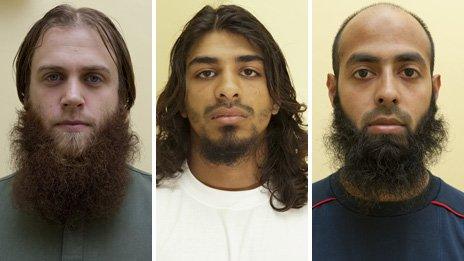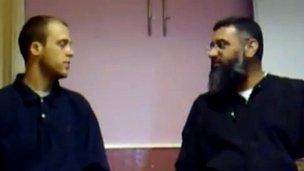Dart, Alom and Mahmood plead guilty to terror charges
- Published

Richard Dart, Imran Mahmood and Jahangir Alom were arrested in the run-up to the Olympic Games
Three British men have pleaded guilty to preparing for terrorism acts overseas.
One of the men used to be a police community support officer and another was a recent convert to Islam.
Richard Dart, Jahangir Alom and Imran Mahmood all pleaded guilty at a hearing at the Old Bailey ahead of their expected trial.
They were arrested in London weeks before the Olympic Games in July 2012. They will be sentenced later.

Dart, also known as Salahuddin al-Britani, appeared in a BBC documentary after he converted to Islam
The three men were charged last year with engaging in preparation for acts of terrorism by travelling to Pakistan for training between July 2010 and July 2012 and by "advising and counselling" acts of terrorism by providing information about how to go to the country for the same purpose.
The precise activities of the men have not been disclosed in court ahead of sentencing, but the BBC understands that the operation involved security services in both the UK and Pakistan.
Mahmood had been the first to travel to Pakistan where security chiefs feared he was receiving training with jihadists near the border with Afghanistan. In the summer of July 2011, the Pakistani authorities detained him before deporting him to the UK. Dart and Alom had arrived in Pakistan the same summer.
All three men were arrested shortly before the Olympics amid intelligence that Dart and Alom wanted to use Mahmood's contacts to return to Pakistan.
'Completely misguided'
Alom, 26, of Stratford in East London, used to be a police community support officer.
Using the name Abu Khalid, he appeared in a video posted on YouTube to talk about why he left the job.
"Before I was practising, I used to be in the Met police. My profession was a Police Community Support Officer," he says.
"I was kind of misguided, completely misguided. I didn't know what Islam was at the time and I used to support police officers on the frontline and carry out Section 44 Terrorism Stops [a form of stop-and- search].

Jahangir Alom was a former Police Community Support Officer
"I used to implement the kuffar [unbeliever's] law on the streets of London and I used to support the kuffar regime."
In the video, he says he became a PCSO to help his community, Muslim or not, and had hoped to climb up the police career ladder to become a chief inspector.
Asked why he left the police, he says that the decision came after he met a number of "brothers" who taught him the true path.
They convinced him that it was sinful to be in the police, despite leading scholars saying different.
'Foolish people'
His co-defendant Richard Dart is a 30-year-old white convert from Dorset who moved to London.
His step-brother made a BBC documentary in which he explored why Dart had turned to a radical interpretation of Islam and had taken the name Salahuddin al-Britani.
After moving to London he briefly worked as a security guard for the BBC.
In one incident in the film, Dart is seen on a megaphone at a protest in Barking, East London, as the 1st Battalion Royal Anglians return from Afghanistan.
"When are people going to wake up," he said. "You foolish people risk your life… misguide you into the hell fire… educate yourself… you foolish people."
In another incident, he accused football fans of leading "degenerate lifestyles" and of enslaving themselves to the devil.
Dart also appeared at events in London in which he said he was a representative of Muslims Against Crusades.
During the investigation into the three men, police recovered parts of text messages, including one mentioning "WB". Officers believed it referred to Wootton Bassett, Wiltshire - a town known for military repatriation processions from a nearby RAF base. It formed no part of the guilty pleas put forward at the Old Bailey which relate to activities overseas.

A film of Dart's conversion by Anjem Choudary was promoted online
The home secretary subsequently banned the group in November 2011, saying that it was the latest incarnation of a group already on a list of proscribed terrorist organisations.
The leading public figure in the group before its ban was Anjem Choudary. He converted Dart and has appeared at the same events as him.
No evidence has been presented in court as to how Dart and his co-accused were recruited to commit the offences to which they have pleaded guilty - and Mr Choudary said he had no idea either.
"I have a responsibility towards my Muslim brothers and sisters," he told the BBC.
"But that does not mean we are training anyone, that we are sending anyone abroad to fight. We don't have any military colleges where someone is learning how to make bombs.
"If someone is doing anything like that - and I don't think Salahuddin and Jahangir are, by the way - they are doing it behind the scenes, they are not doing it from encouragement by us."
Wife sentenced
Alom's wife, Ruksana Begum, previously pleaded guilty to possession of information likely to be useful to a terrorist by having a memory card carrying copies of a jihadist magazine, Inspire.
The publication - aimed at English-speakers - included information about using handguns and remote detonation of explosives.
She received a 12-month jail sentence in December 2012.
Two of Begum's brothers were jailed last year after pleading guilty to a bomb plot that could have targeted the London Stock Exchange.
Abdul Miah was sentenced to almost 17 years and Gurukanth Desai to 12 years.
In mitigation, her lawyer told the court that she had obtained copies of the magazine to better understand the ideological background of offending that led to her brothers' incarcerations.